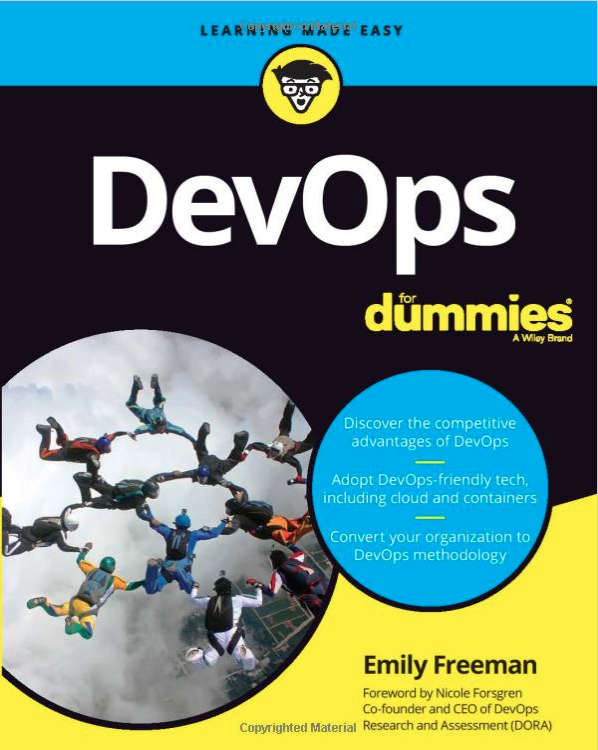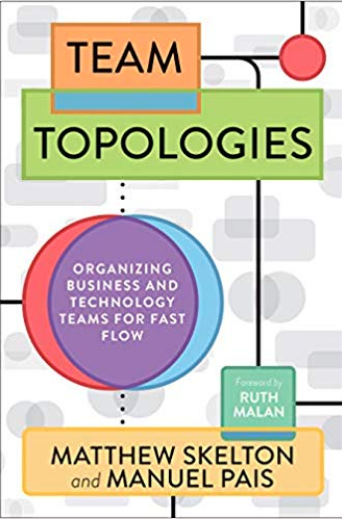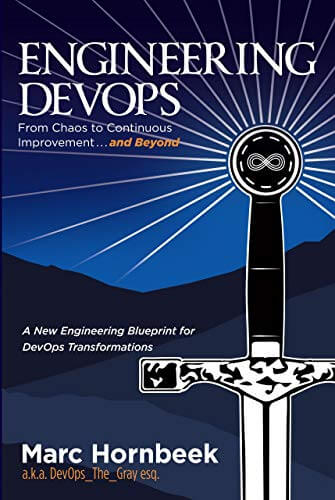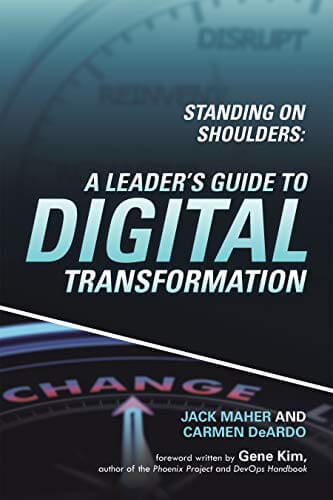Upskilling for DevOps continues to be the biggest challenge—and opportunity—as DevOps initiatives and digital transformation initiatives continue to advance (as The DevOps Institute's new report attests), so as 2020 rolls out it's only fitting to recommend the best books for learning.
The seven newly published books about software delivery, DevOps, and digital transformation listed below are must-reads for career advancement. These titles teach new ideas and captivate the imagination as to what's possible. Reading these books will give you a sense of community, as well as an understanding of the DevOps challenges you face—and how to overcome them together.
The Unicorn Project: A Novel about Developers, Digital Disruption, and Thriving in the Age of Data
Author: Gene Kim
The Unicorn Project is the follow-up to Kim's classic book, The Phoenix Project. Here, Kim takes another exasperating journey into Parts Unlimited, a company whose mass extinction looms due to the outcomes of a payroll outage. This is a story about rebel developers and business leaders bridging a gap to work together, and racing against time to survive in a time of unprecedented fear and loathing.
You'll be hooked reading about how the lead character and protagonist of the story, senior developer Maxine, fights her way through the worst that bureaucracy has to offer—a system where there are more committee meetings, paperwork, and approval processes than actual work getting done.
This book also examines the problems posed by data, and what is required to actually use it to solve the most pressing business problems. "Digital disruption requires us to understand our customers, and is greatly aided by data we already have, which we need to manipulate, transform, and safely allow teams to use," Kim says.
DevOps for Dummies
Author: Emily Freeman
If you or your company is in the early stages of DevOps adoption, this book should be essential reading for your developers and operations professionals—period. Freeman is team lead for the modern operations team in cloud advocacy at Microsoft. In DevOps for Dummies, Freeman describes DevOps as an engineering culture of collaboration, ownership, and learning, with the purpose of accelerating the software development lifecycle from ideation to production.
This fun, well-laid-out guidebook helps make DevOps more approachable and real for those in need of a primer on this way of working. It preaches the process of learning and thinking in new and different ways.
I applaud Freeman for her work and the interest she takes in the human side of tech. Much as she helps the humans of DevOps in her everyday job, Freeman has written this book so the reader gets the benefit of "choose your own journey" while reading, so you have the benefit of skipping around to different topics with easy-to-follow annotations and diagrams.
Team Topologies: Organizing Business and Technology Teams for Fast Flow
Authors: Matthew Skelton and Manuel Pais
In Team Topologies, Skelton, head of consulting at Conflux, and Pais, DevOps delivery coach and consultant, unwrap the secrets of successful team patterns that they have seen over many years of consulting around the world. Their goal is to assist IT organizations as they select and adapt specific team patterns to help ensure success, while keeping their software healthy and optimizing for value streams.
If you care about the effectiveness of software delivery and the operations of effective software systems, this book will give you ideas about how to approach new ways of optimizing team structures. Organizational design is at the heart of this book, and the Team Topologies model has been tested and proven across businesses at varying levels of maturity, according to the authors.
Since teams are always changing and therefore a work in progress, I appreciate the explanations that the authors provide as to why autonomous teams need to be interactive and support one another. If teams don't evolve themselves, how else will they be able to deliver value quickly to their customers?
Cloud Native Patterns: Designing Change-Tolerant Software
Author: Cornelia Davis
In Cloud Native Patterns, Davis, vice president of technology at Pivotal Software, draws on 25 years of experience to create a road map-style book to identify and amplify the key practices and patterns that set cloud-native applications apart. With incredible examples and expert advice for working with apps, data, services, routing, and more, she provides straightforward advice on how to design and build software that functions on modern cloud platforms.
I appreciate the techie nature of this book in that it helps prove the theory that going to the cloud is more about how you design your applications than where you deploy them. What's more, she has written a beautiful, architectural book with plenty of code examples to support her design-related discussions.
I like how she writes about cloud-native interactions, not just on the client or services side, but also the relationship to the data and behaviors resulting from the distributed systems that make up software. Davis is a technologist with a brilliant mind for programming.
War and Peace and IT: Business Leadership, Technology, and Success in the Digital Age
Author: Mark Schwartz
War and Peace and IT is Schwartz' third book, after The Art of Business Value and A Seat at the Table. This time he dives into why the business-IT divide must no longer continue. He brings his unique perspective and experience (he's an enterprise strategist for Amazon Web Services and former CIO of the US Citizenship and Immigration Services) to business leaders looking to lead their company into the digital age. Schwartz shares why leaders must throw out old management models and stereotypes, and harness the expertise and innovation that's already within the company: the IT organization.
Schwartz draws historical references and parallels for business leaders who want to unlock their enterprise's digital transformation and uses clear context and strategies. As he puts it, digital transformation exposes several tensions that exist within organizations that you must address (and conquer) before you can win a war with competing companies on the digital battleground.
I love how the author pops the current "blame culture" bubble in his book, and how brilliantly he explains that now is the time to change not only the enterprise's relationship with technology but its relationship with technologists. If you want to bring technology to the heart of your work at your organization, this book is for you.
Engineering DevOps: From Chaos to Continuous Improvement .... and Beyond
Author: Marc Hornbeek
Presented in five parts, Engineering DevOps is really a reference guide. Hornbeck, CEO at Engineering DevOps Consulting, has more than 40 years of accumulated knowledge and experience in engineering, most of which came before DevOps was even a thing. He has a unique perspective on the ever-changing landscape that makes it difficult for tech vendors and consumers to share common ground.
Hornbeck frames DevOps as an engineering problem and provides a step-by-step prescription that IT leaders and practitioners can follow to understand, assess, define, implement, operationalize, and evolve DevOps through an engineering mindset.
As with his desire to help others, Hornbeck bestows his breadth of knowledge and insight to provide one of the more comprehensive guidebooks I've seen. He also describes in detail how to engineer a DevOps solution for any organization at any given starting point.
Standing on Shoulders: A Leader’s Guide to Digital Transformation
Authors: Jack Maher and Carmen DeArdo
Standing on Shoulders explains how transforming organizations to compete in today's digital age requires both a combination of "old-world thinking" of quality and differentiation and "new-world thinking" of meeting a market where it wants to be. But, the authors caution, making an organization "digital" is about more than creating a compelling mobile app and moving to the cloud. People must think and act differently.
In this leader's guide to digital transformation, the authors offer practical, actionable information on building an employee- and customer-obsessed culture that drives speed and efficiency. Many of the concepts and ideas presented date from even before the Industrial Revolution began.
This book comes from the minds of two incredible technology leaders who developed and led their own transformation efforts within Fortune 100 companies: Maher is a digital transformation evangelist and certified DevOps trainer, and DeArdo is principal flow advisor at Tasktop.
Read this book and you'll learn how to execute change in any organization, whether it involves a hard pivot for survival or a longstanding, evolutionary program by design.
Those are my recommendations. Is there a great title I missed? Share your thoughts and suggestions in the comments section below.
Keep learning
Take a deep dive into the state of quality with TechBeacon's Guide. Plus: Download the free World Quality Report 2022-23.
Put performance engineering into practice with these top 10 performance engineering techniques that work.
Find to tools you need with TechBeacon's Buyer's Guide for Selecting Software Test Automation Tools.
Discover best practices for reducing software defects with TechBeacon's Guide.
- Take your testing career to the next level. TechBeacon's Careers Topic Center provides expert advice to prepare you for your next move.









